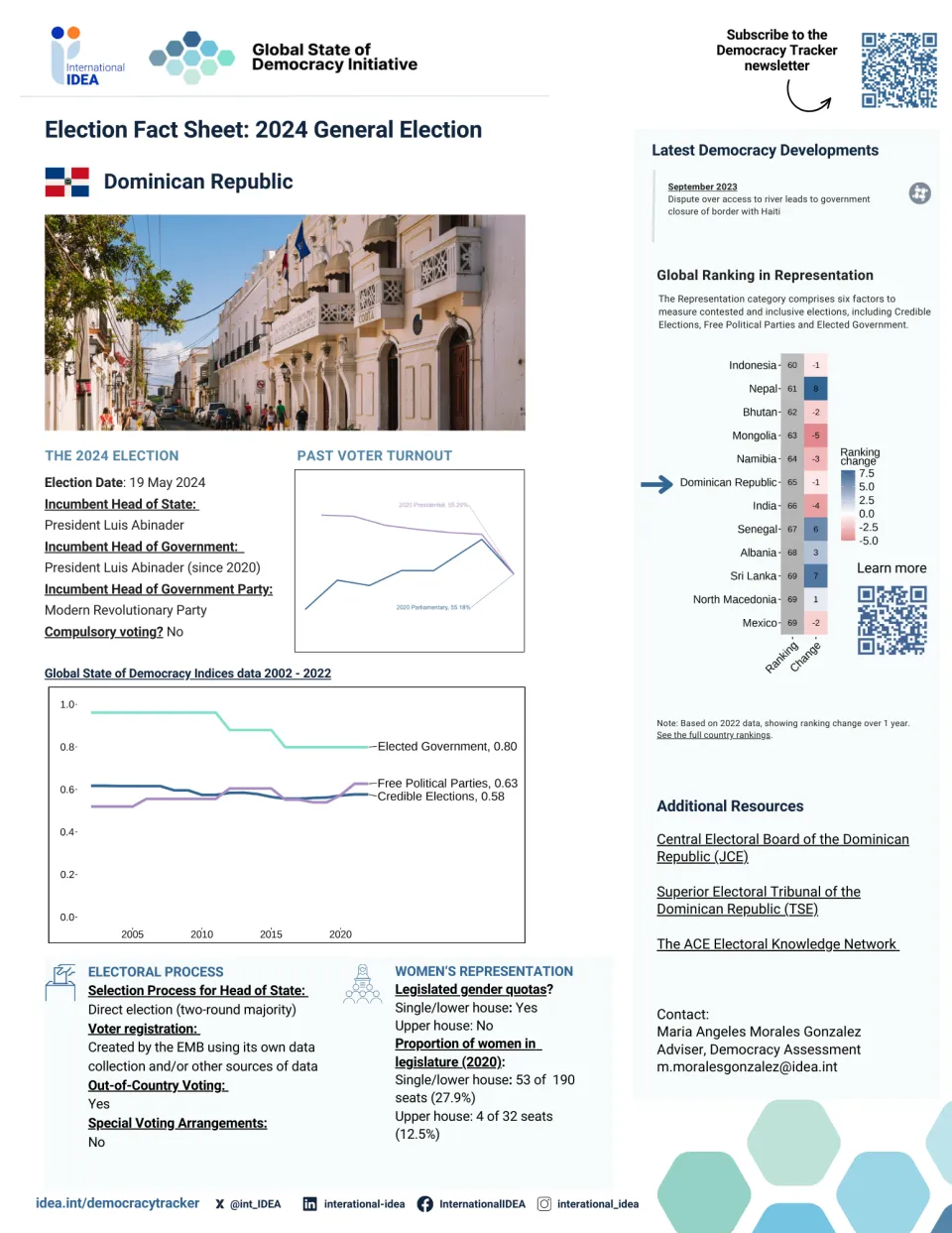
Dominican Republic
The Dominican Republic (DR) performs in the mid-range across all four categories of the Global State of Democracy framework. It is among the world’s top 25 per cent of countries in Civil Society, Civil Liberties (and most of its subfactors), Inclusive Suffrage, Local Democracy and Free Political Parties. Over the past five years, it has significantly improved in Free Political Parties, Freedom of the Press, Judicial Independence and Absence of Corruption. The DR has an upper-middle income economy, driven by tourism, finance, telecommunications, trade, manufacturing, and construction.
The DR’s population is mostly of mixed-ethnicity, with Black and White minorities. Demographics reflect a legacy of colonialism and racial discrimination that continues to impact perceptions of ethnic identity. Tense relations with Haiti impact the hundreds of thousands of Dominico-Haitians in the country—a distinct cultural and linguistic minority which disproportionately struggles with poverty and discrimination. As Haiti’s humanitarian crisis continues, increasingly restrictive immigration policies mark the political landscape.
The DR’s legal framework guarantee women’s equal rights and includes a National Plan to enhance gender equality, policies to support victims of gender-based violence and gender quotas. Gender-based violence remains widespread, disproportionately affecting Black and migrant women. The country has one of the region’s highest rates of femicides and teenage pregnancies and maintains a total abortion ban. While homosexuality legal—except for members of the police and armed forces—LGTBQIA+ individuals still face discrimination and stigma.
The country has faced high political volatility over the last decade due to the division and weakening of the main parties, and the impact of corruption scandals. In 2017, the discovery of government officials’ involvement in the Odebrecht bribery scheme sparked popular demand for justice and accountability. This inspired the Green March movement, which demanded accountability and governance reforms to enhance public sector transparency and reflected popular fatigue with the political establishment. The discontent also fuelled civil society’s determination to reject attempts at extending presidential term limits. The growing public frustration crystallized in 2020, when unprecedented problems with the electronic voting system in municipal elections sparked widespread anti-government protests and triggered an institutional crisis. Later that year, the presidential elections unseated the Dominican Liberation Party after nearly two decades of political hegemony.
In response to public demands, the government has proposed an agenda that prioritizes judicial independence and an improved public administration based on political consensus. Since then, the country has significantly improved its capacities in preventing, detecting, and punishing corruption, evident in the appointment of a former Supreme Court magistrate as a special prosecutor to pursue cases involving former high-ranking officials, the passing of new civil laws to recover stolen assets, and the appointment of compliance officers to oversee public spending. In 2024, Congress approved a set of amendments to the constitution to ensure the Attorney General’s independence, introduce presidential term limits, and bar officials from benefiting from reforms made during their terms.
Looking ahead, it will be important to observe how recent economic growth translates into greater Economic Equality and Gender Equality. Monitoring Social Group Equality remains key, especially given tensions with the Haitian Dominican community, who continue to suffer from statelessness and discrimination. Gender equality warrants close attention as Congress has recently approved a new penal code that maintains the total abortion ban, despite broad demands from civil society to include exceptions under 3 grounds.
Last Updated July 2025
https://www.idea.int/democracytracker/
December 2025
Investigation exposes corruption in public health system
In December, the Dominican Republic's Public Prosecutor launched ‘Operation Cobra’, exposing a massive corruption scheme within the National Health Insurance agency (SeNaSa), implicating former director Santiago Hazim and other officials. Those implicated allegedly embezzled over DOP 15 billion (approximately USD 236.5 million) through fraudulent contracts, bribes, and double accounting practices, severely impacting public health funds. Prosecutors revealed that bribes exceeded DOP 2 billion (USD 31.5 million), and public funds were diverted from essential healthcare services. The scandal has sparked nationwide protests, with hundreds of citizens demanding accountability and systemic reforms to prevent future misuse of public resources. In response, a judge ordered several of the accused to be held in pretrial detention while investigations are ongoing.
Sources: AP News, Ministerio Publico, El Nacional, Diario Listín, Dominican Today, Diario Libre
September 2025
President promulgates new penal code reforming the justice system amid criticism
On 3 August, President Luis Abinader signed a new penal code set to take effect in August 2026, marking a major reform of the Dominican Republic’s justice system. Replacing legislation from 1884, the updated code addresses previously unregulated crimes, including femicide, cyberbullying, corruption and enforced disappearances. It increases maximum sentences from 30 to 40 years for individual crimes, including terrorism and sexual violence, and allows cumulative sentences of up to 60 years for multiple serious offenses. The code also introduces corporate criminal liability, holding companies accountable for crimes committed in their name. Additionally, it extends statutes of limitations for sexual offenses to 20 years for adults and 30 years for minors, ensuring greater access to justice for victims. Despite these advances, the code has faced criticism for upholding a total abortion ban, even in cases of rape, incest or life-threatening pregnancies, and for omitting explicit protections against discrimination based on sexual orientation or gender identity.
Sources: Presidencia de la Republica Dominicana, Amnesty International, Latin America Reports, Ley 74-25 Orgánica que instituye el Código Penal de la República Dominicana
April 2025
Government announces new measures to tackle irregular migrants from Haiti
On 6 April, President Luis Abinader announced 15 new measures targeting undocumented migrants from Haiti, including deploying over a thousand new soldiers to the border and expanding the border wall with Haiti. The government also announced intentions to “Dominicanize” employment by attracting Dominican workers and promoting the mechanization of sectors dominated by Haitian workers. Among the most controversial actions is a protocol requiring hospital personnel to request ID, proof of employment and residence before providing care. While undocumented patients will still be treated, they face deportation once recovered. Human rights organizations have called for the government to stop massive deportation and to repeal the hospital protocol, calling it illegal and warning about the potential risk to the lives of migrants who will be forced to choose between healthcare and possible deportation. The government says the measures are necessary to address rising irregular migration, ease pressure on public services, and manage security risks.
Sources: Listín Diario, The Guardian, Amnesty International, BBC
Hundreds of people die in an accident at a nightclub
On 8 April, a tragedy occurred when the roof of Jetset, a popular Santo Domingo nightclub, suddenly collapsed onto more than 500 attendees. Over 230 people died in the incident. The government has announced the formation of a special committee—comprised of local and international experts—to investigate the incident. Several lawsuits have been filed against the club’s owner and local officials, alleging failure to enforce and maintain basic safety standards prior to the tragedy. The nightclub disaster comes amid a pattern of recent building collapses in the country that have also resulted in fatalities and raises the question of state co-responsibility over the event. Currently, the country has no government agency dedicated to overseeing the maintenance of private businesses; however, the government has announced plans to introduce new legislation in response.
Sources: New York Times, Listín Diario, El Pais
October 2024
National Assembly approves constitutional amendments
On 27 October, President Abinader promulgated a set of constitutional amendments promoted by his government. The approved amendments transfer the responsibility for appointing the Attorney General and Deputy Attorneys General from the president to the National Council of the Judiciary. This change intends to guarantee the independence of the Attorney General’s office. The amendments also introduce presidential term limits (capped at two terms) to the list of unamendable constitutional provisions, which seek to guarantee the alternation of power. They also prevent elected officials from benefiting from constitutional changes made during their term in office. Additionally, they reduce the number of seats in the lower chamber from 190 to 170 and determine that presidential, legislative and municipal elections will be held on the same day. Civil society organizations have criticized the government for not conducting public consultations to inform the constitutional amendments.
Sources: CNN, Dominican Today, Diario Libre (1), Presidencia Republica Dominicana, International IDEA, Diario Libre (2)
See all event reports for this country
Global ranking per category of democratic performance in 2024
Basic Information
Human Rights Treaties
Performance by category over the last 6 months
Blogs
Election factsheets
Global State of Democracy Indices
Hover over the trend lines to see the exact data points across the years
Factors of Democratic Performance Over Time
Use the slider below to see how democratic performance has changed over time


